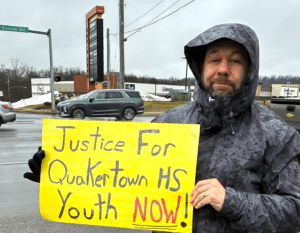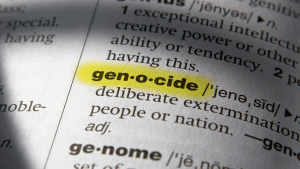What are the three branches of government? Where did George Washington cross the Delaware? Who is your state senator? If you couldn’t answer all three questions, don’t be ashamed. You might not know the answers because you weren’t taught them.
According to the Thomas Fordham Institute, Pennsylvania got an “F” grade in 2021 for its quality, clarity and uniformity of civics and history education standards. For a state so enriched in history, this seems unacceptable. Monday’s House Majority Policy Committee seemed to agree as they hosted a public hearing at New Hope-Solebury High School to hear the concerns from past lawmakers and current educators on civics education, as well as what solutions could be.
The hearing was chaired by state Representative Tim Brennan (D-Bucks) and took place in front of many high school students whom Brennan had met beforehand on Monday to discuss the importance of civic duty.
“The future of our democracy rests in the hands of the next generation. But if they’re not well-informed or prepared, it’s likely they won’t participate at all. Discussions like these are important to ensuring the vitality of both our democracy and our commonwealth,” said Brennan. “I’m honored we had this important conversation among the students and faculty of New-Hope Solebury High School. They continue to take great care to provide students with a robust civics education, and the school was just ranked No.4 in the state by U.S. News & World Report. From the administrators to the students, it really shows.”
The first speaker, former Pennsylvania Governor Mark Schweiker, gave the opening remarks for the day’s event.
Both Brennan, a Democrat, and Schweiker, a Republican, talked about how having the 250th anniversary of the United States next year should make lawmakers take a closer look at how far behind the state is in civics education. After talking about the importance of Washington’s Crossing in Lower Bucks and the ensuing Battle of Trenton, Schweiker asked rhetorically, “Do sufficient numbers of older people and young people even know that that’s the case?” Schweiker then talked about his involvement in America250PA, a program set up to teach PA citizens about the Commonwealth’s role in the American Revolution in the lead up to the celebrations next year.
Following the former governor were former Congressmen James Gerlach (Republican) and Joe Hoeffel (Democrat), who are also founders of PA Civics, a committee of more than 25 organizations with the goal to increase civics education. Their initial goal was to create a plan to implement Act 35, which was passed in 2018. The act, according to PA Civics, “requires that all school and education entities administer a locally developed assessment of U.S. history, government, and civics at least once to students during grades 7-12, beginning with the 2020-2021 school year.”
According to Gerlach, however, COVID-19 set Act 35 on the backburner. And once it was implemented, there were concerns. “It became clear to us that while it is a very laudatory enactment, it’s relatively weak in uniformly advancing civics across the state,” he said.
“We firmly believe that the window of opportunity for bipartisan, collective action to move Pennsylvania to the top in quality civics education is right before us,” said Gerlach. “We can achieve that hugely important success if we all recognize that the future of America is closely tied to how well we prepare our children here in the Commonwealth to be the knowledgeable and engaged leaders we will need them to be.”
While Act 35 does force students to take a civics test, that test can be taken at any point between grades 7-12, and it depends on the school a student goes to. So, a student in Central Bucks might take the test in 7th grade, while a student who goes to a private school might take in 12th grade, giving mixed results to lawmakers and educators.
Act 35 also does not set a curriculum on what should be taught, which leaves educators on their own for what to teach. When giving her testimony, Lauren Cristella, President of the Committee of Seventy, said, “For every one minute a teacher spends preparing for a science or math class, because those classes are prescriptive and have a curriculum that is set to the standard, they spend 45 minutes prepping for a social studies class or a civics class. Because they are on their own. They have to come up with those lessons.”
Later in the hearing, Shannon Salter, a civics teacher in Allentown for 11 years and chair of the Educating for American Democracy Teacher Leadership Task Force, spoke about why civics education is so important to be taught, including language improvement and workforce development. “In a study that the Chambers of Commerce co-founded with Harvard University, they found that students who entered the workforce with a robust civics education were far more likely to be both willing and able to take their place in leadership in industry.”
With all these positives, why are educators so unwilling to teach this curriculum? According to Salter, the current political environment is playing a massive part. This polarization “has led many states to neglect and avoid even having conversations about civics education,” she said.
During the hearing, many possible solutions were given by those testifying. One solution presented by Rep. Hoeffel is to update the state standards for social studies, which have not been updated by the PA Department of Education since 2003. “The department means well, they have good people working there,” he said. “But they’ve got a lot on their plate and lots of things that keep them from attending everything that we’d like them to attend to. You can make them attend. You can ask them through legislation to upgrade those standards.” Hoeffel also said that it might take one to two years to update the standards, “but it needs to be done.”
Another solution that was given by many of the speakers was to give students a seal of civic engagement that can be rewarded to students during graduation. In the plan laid out by PA Civics, the seal would say “that student has qualified as a civilized expert, or whatever phrase you want to use. Other states do that, and employers like to see it,” said Hoeffel.
READ: How Would Ordinary Voters Resolve Pennsylvania’s Big Election Policy Debates?
When also talking about what a civics seal program could look like, Salter described it as a locally runned initiative. “The civics seal allows local communities to retain control over decisions on how to best meet the needs of students and their communities,” she said. “States have avoided setting standards for civics learning for decades, out of fear of taking away local control over a content area that, by necessity, sometimes fosters discussion of difficult topics. But we now have field proven models of implementation that show that we can both set the bar high for learning experiences that students have while also giving communities multiple pathways to clear that bar.”
“I loved to see how the entire committee was so engaged and had wonderful questions,” said Cristella after the hearing. “It seemed like they’re really committed to improving the quality of civics in Pennsylvania.”
Cristella added, “We’ve got a final opportunity here, going into the 250th anniversary and leading to the 250th anniversary in 2037 of the Constitution as a goal for improving our civic education.”






